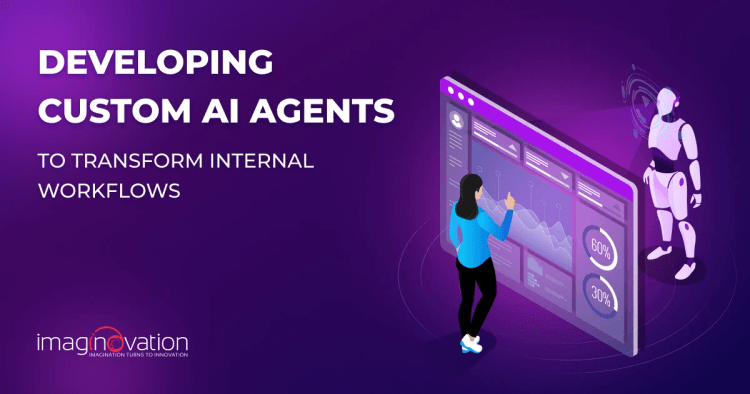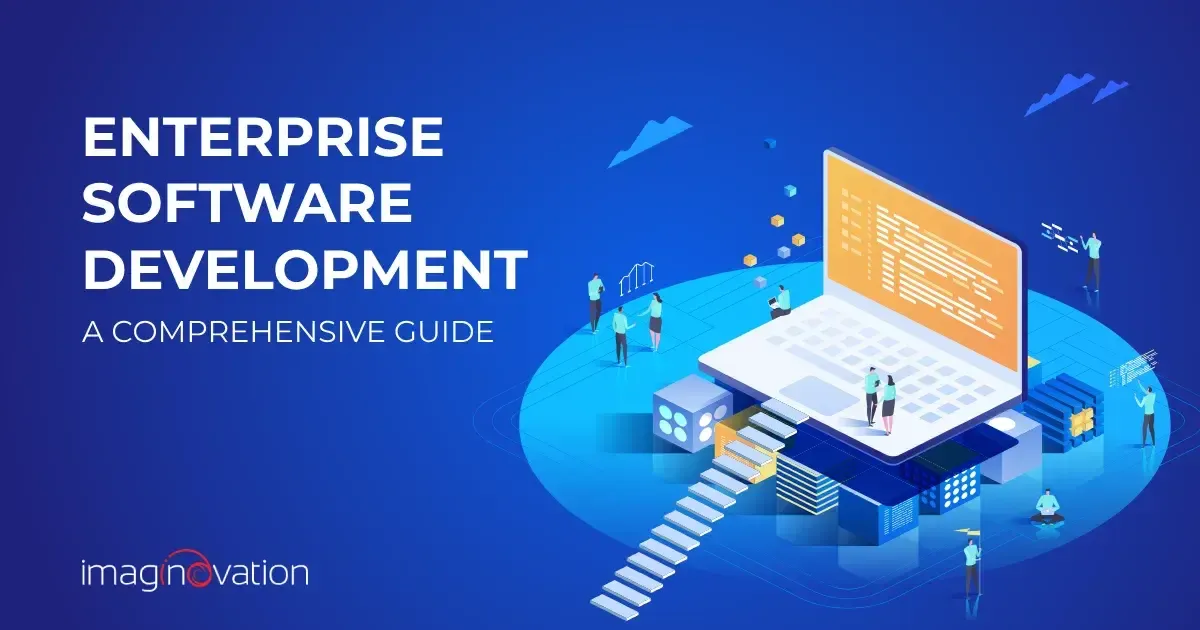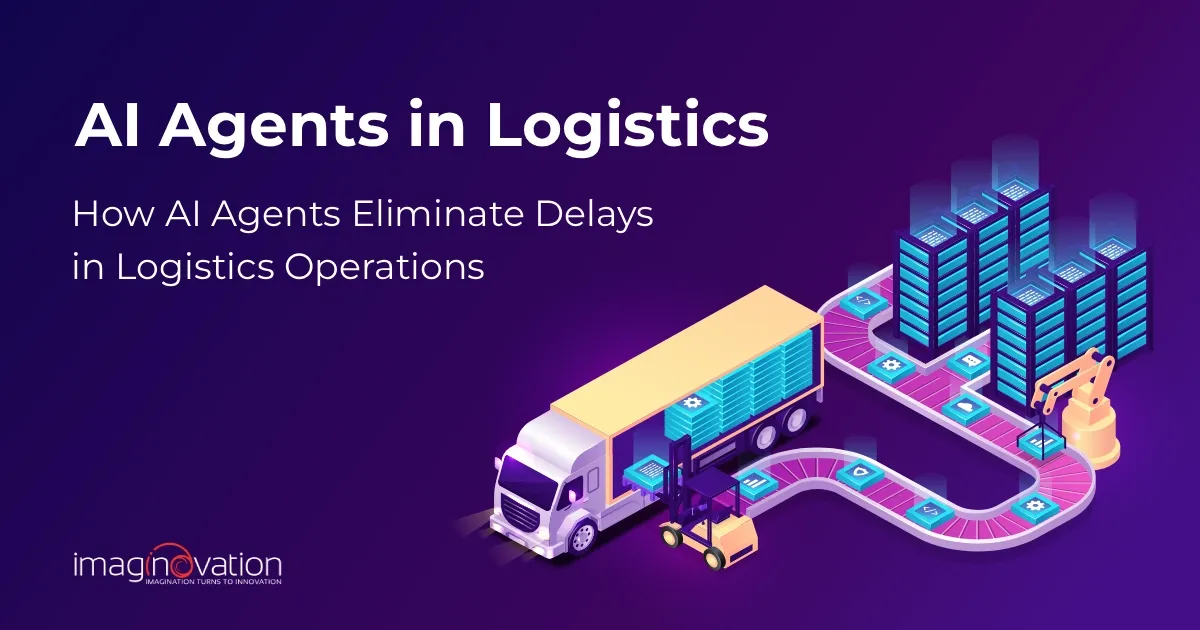To estimate the cost of building a website or an app, use our app cost calculator tool.
Every minute spent on manual data entry, waiting for approvals, or chasing down routine information costs your business money. Across industries, organizations lose millions of dollars annually to inefficient internal processes that could have been automated years ago.
The solution isn't another generic AI tool that promises everything but delivers little. It's custom AI agents: intelligent systems built specifically for your workflows, your industry, and your unique challenges.
A custom AI agent can integrate seamlessly with existing systems, learn your team's decision patterns, and execute complex multi-step processes with precision.
The result?
Operations that run faster, decisions made consistently, and teams freed to focus on strategic work that actually moves the needle.
Organizations are deploying these tailored AI solutions to gain competitive advantages. Here's how custom AI agents are transforming internal operations and why your next process automation strategy should include a custom-built AI agent.
Let's start.
What Are Custom AI Agents?
General-purpose AI models aim to solve broad and generic problems, whereas custom AI agents are specialized software entities that are designed to perform specific tasks.
The agents are purpose-built, domain-specific, and workflow-aware, understanding and acting within a defined business context.
Key Characteristics
1. Domain-specific
These agents are designed to serve a targeted domain and are knowledgeable about the data and knowledge specific to a particular business function and industry (e.g., logistics, field service, HR).
2. Context-aware
Recognise and adjust to subtleties in language, internal procedures, and decision-making guidelines.
3. Customized Workflows
Designed to improve productivity without interfering with operations by aligning and integrating with current workflows and systems.
Use Cases
- Internal Workflow Automation: Automates recurring tasks, such as ticket triaging, inventory updates, or report generation, to improve overall speed and consistency.
- Data Integration: Combines data from several systems (such as CRM, ERP, and IoT platforms) and presents the disparate pieces of information cohesively.
- Decision Support: Provides real-time insights, makes recommendations for the next course of action, or identifies irregularities during intricate operations to help human teams.
Compared to off-the-shelf AI tools, custom AI agents offer:
- Greater accuracy
- Quicker implementation
- Higher return on investment
- Closer alignment with your specific business needs
Why Invest in Custom AI Agent Development for Internal Workflows?
Custom AI agents with their deep contextual awareness can handle complex operational tasks. They stand out as powerful catalysts for efficiency, growth, and innovation.
Key Benefits of Custom AI Agents
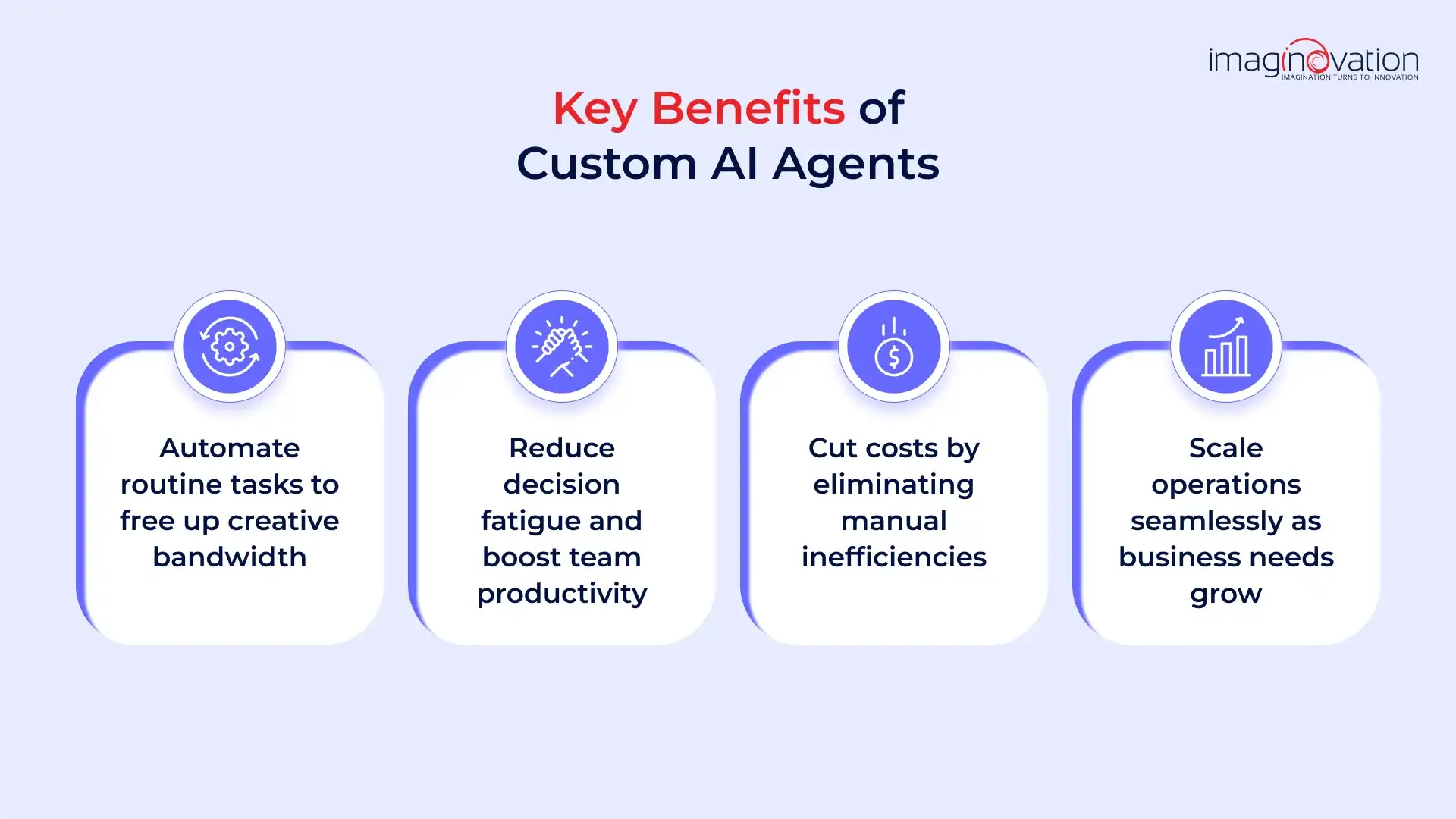
- Process Automation: Frees teams to focus on more strategic and creative work, as these agents automate routine and mundane tasks
- Productivity Boost: These agents lift the heavy burden of constant decision-making for complex tasks. This saves teams time and boosts overall efficiency.
- Cost Reduction: AI agent automation helps reduce operational expenses by eliminating costly inefficiencies and errors associated with manual processes.
- Scalable Operations: AI agents help you easily adapt to your changing business needs without the need for reinventing your systems.
Table 1: Comparative Overview of Off-the-Shelf AI vs. Custom AI Agents
| Benefit | Off-the-Shelf AI | Custom AI Agent |
|---|---|---|
| Fit to workflow | No | Yes |
| Data security | Limited | High |
| ROI | Variable | High |
AI agent development services deliver measurable ROI with aspects such as faster task resolution, improved productivity, and enhanced user experiences.
They achieve over 40% efficiency gains by automating repetitive work, reducing delays, and freeing teams for strategic tasks.
With always-on support and scalable workflows, they improve satisfaction while enabling growth without proportional cost increases.
Investing in custom AI agents transforms internal operations into intelligent, scalable systems, unlocking higher productivity, lower costs, and strategic agility at scale.
What Are the Key Steps Involved in the Custom AI Agent Development Process?
Building a custom AI agent involves a systematic process, and here's a step-by-step breakdown.
Step 1: Define Objectives & Use Cases
Start by identifying the internal pain points, as they will provide valuable insights into the real operational needs. Consider outlining specific goals for automation, efficiency, or decision support.
Ask Yourself:
- What are the repetitive tasks that are the most time-consuming?
- Which processes have bottlenecks?
- What are the most common errors in current workflows?
- Which manual tasks can benefit from automation?
- Which areas require more rework?
Step 2: Data Collection & Preprocessing
Identify and gather relevant domain-specific data from sources, including logs, databases, and APIs.
Next, work on removing inconsistencies, irrelevant or erroneous data, so that you have clean data that can be used to train the model.
Step 3: Model Selection & Fine-Tuning
Now that your goals and use cases are clear, the next step is to select the right foundation model. Let's examine some widely used models:
- GPT (OpenAI)
- Claude (Anthropic)
- LLaMA (Meta)
- Gemini (Google DeepMind)
- Mistral
- Command R (Cohere)
- Jurassic (AI21 Labs)
- ERNIE (Baidu)
- PaLM (Google)
Next, choose the most suitable model based on your domain, infrastructure, and regulatory needs.
Start with fine-tuning it on proprietary data to ensure domain-specific accuracy, compliance, and relevance to internal workflows.
Step 4: Design Logic & Workflows
Determine how the conversational flow will transition, and design the decision rules and escalation logic. Remember that the task-handling capabilities must be tailored to business processes.
Step 5: API Integration & System Infrastructure
Build APIs to connect the agent with key internal systems, such as:
- *CRM (Customer Relationship Management): Salesforce, HubSpot, Zoho CRM*
- *ERP (Enterprise Resource Planning): SAP, Oracle NetSuite, Microsoft Dynamics 365*
- *ITSM / Ticketing Platforms: ServiceNow, Jira Service Management, Freshservice*
This integration ensures seamless data flow and enables end-to-end process automation across the organization.
Step 6: Testing & Validation
Remember to run real-world tests and edge cases to confirm the agent’s accuracy, safety, and reliability.
Step 7: Deployment & Continuous Improvement
Finally, roll out the agent in phases, monitor performance, gather feedback, and retrain iteratively for evolving business needs.
Investing in custom AI agents transforms internal operations into intelligent, scalable systems, unlocking higher productivity, lower costs, and strategic agility at scale.
What Are the Key Considerations When Developing AI Agents for Internal Operations?
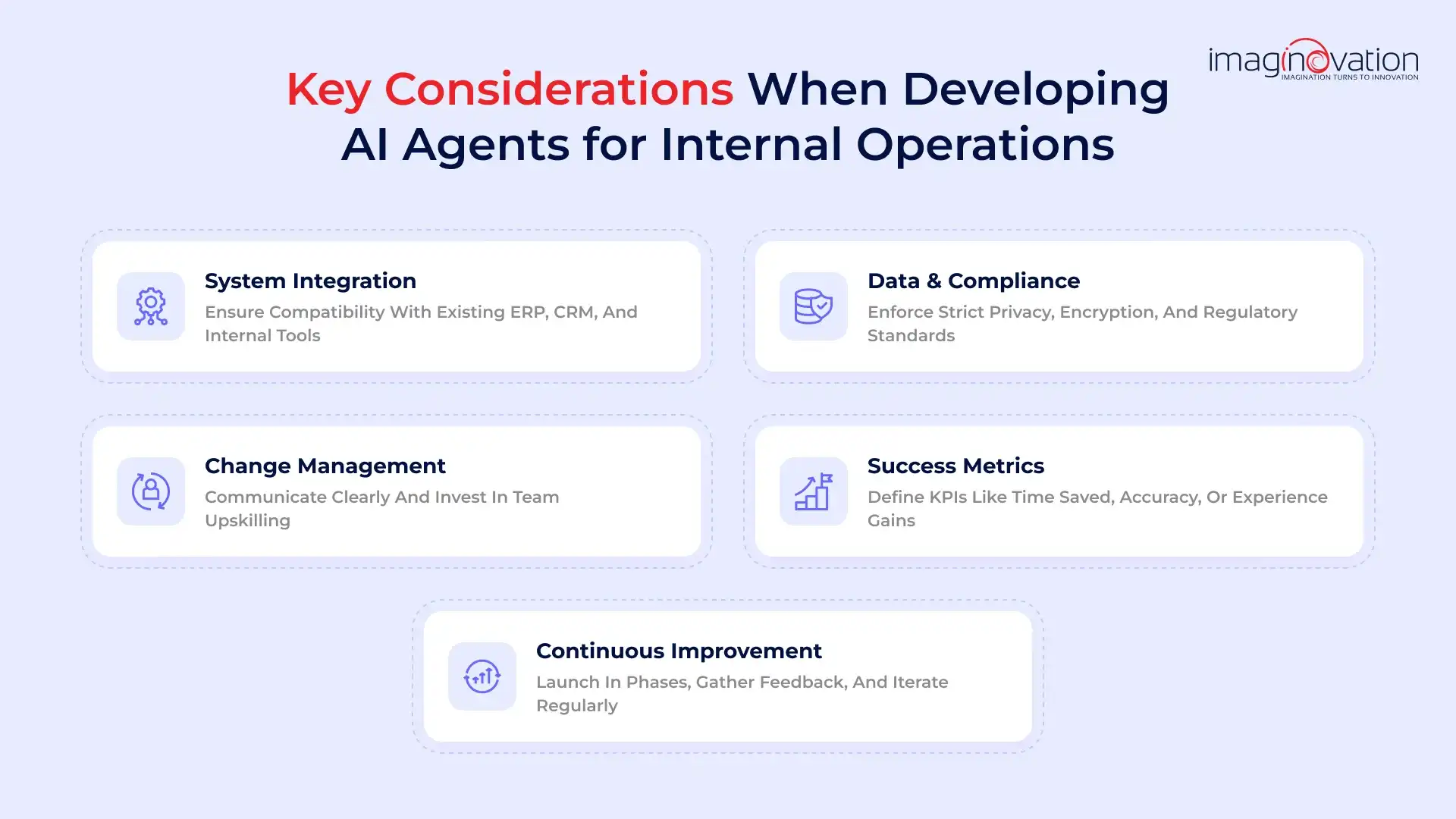
There’s a lot of enthusiasm around building AI agents because they can help you enhance internal operations.
When carefully planned and executed well, the deployed agents can support efficiency.
Let's examine some key considerations that will ensure success:
1. System Integration
Internal operations may already have existing platforms, including ERP, CRM, ticketing tools, or proprietary software, and AI agents must integrate with these.
One of the factors to consider when developing is that any compatibility gaps that are there, you bridge them.
There are custom APIs or Robotic Process Automation (RPA) that can ensure uninterrupted workflows.
2. Data & Compliance
Internal operations involve employee data and sensitive business information, which is why, when developing internal agents, strong safeguards are necessary.
Developers must ensure strict adherence to regulations, including GDPR, HIPAA, role-based access controls, encryption, and detailed audit trails.
3. Change Management
Any change requires a buy-in from the teams involved in its operations, and AI adoption is no exception.
The organization needs to manage this shift, where transparent communication is essential to address fears of redundancy and invest in employee upskilling.
AI should be framed as a tool that empowers, rather than replaces, human talent.
3. Success Metrics
Custom AI agents need to deliver consistent value, and it is essential to define what success looks like right from the outset.
Thus, what one can plot is aspects, such as saving time, increasing accuracy, or improving employee experience.
Remember to set measurable KPIs that help to track performance regularly.
4. Continuous Improvement
It is best to launch in phases, focusing on starting with pilot use cases.
Collate real-time feedback, which will help to refine behaviour, retrain models, and improve functionality.
Remember to introduce a culture of iteration that ensures AI agents stay relevant and practical over time.
Many elements come into play when developing AI agents for internal operations, which go beyond technology. The success will depend on seamless integration and a commitment to ongoing improvement. AI can be a true force multiplier for your organization when all such elements are taken care of.
Case Studies: Transforming Internal Workflows with Custom AI Agents
Let's examine some real-world examples of how businesses can enhance their internal operations.
1. Siemens: Smarter Supply Chain with Predictive AI
Challenge: Dealing with unpredictable demand and stock levels after the pandemic.
Solution: The team deployed a predictive AI agent integrated with ERP and logistics systems to forecast demand. The agent could also recommend reorder strategies and monitor disruptions in real time.
Impact:
- 35% reduction in excess inventory
- 65% improvement in service levels
- Proactive alerts for supply issues
AI Agent Services Role: Provided systems integration, domain-specific model training, and advisory on forecasting tuning.
2. Moody’s: Multi-Agent Financial Analysis
Challenge: Deep financial analysis projects were previously outsourced and took a long time.
Solution: The team developed a system of 35 specialist AI agents, each with bespoke instructions and datasets, overseen by supervisory agents.
Impact:
- Faster industry benchmarking
- Multi-perspective analysis for nuanced risks
AI Agent Services Role: Designed agent architecture, prompt strategies, governance oversight, and integration into research workflows.
3. Johnson & Johnson: Autonomous Lab Assistants in Drug Discovery
Challenge: Complex solvent switching and crystalline synthesis in chemical R&D.
Solution: AI agents automatically analyze reaction variables and execute solvent changes at optimal times.
Impact:
- Accelerated synthesis cycles
- Reduced manual lab workload
AI Agent Services Role: Built digital twin infrastructure, validated agent decisions, and ensured regulatory compliance.
4. SS&C Blue Prism: Financial Services Document Workflow Automation
Challenge: High-volume document processing around contracts, invoices, and reconciliation.
Solution: Rolled out over 2,700 intelligent agents for tasks like credit agreement review, contract analysis, vendor invoices, and reconciliation.
Impact:
- $200M+ saved over three years
- 95% faster contract processing
- 90%+ manual effort reduction in invoice workflows
AI Agent Services Role: Conducted system-wide agent development, legal and audit integration, AI governance, and continuous refinement.
5. Everise with Retell AI: Voice AI Handling Support
Challenge: Voice support overwhelmed call centers, with long wait times.
Solution: Retell AI voice agent handled multi-language voice queries with NLP and backend integration.
Impact:
- Contained 65% of support calls via AI
- Wait times dropped from ~5 minutes to zero
- Approximately 600 person-hours saved
AI Agent Services Role: Tailored language models, orchestrated voice-NLP pipelines, integrated with support platforms.
Table 1: Summary of Use Cases of Custom AI Agents
| Company / Context | Use Case | Efficiency Gains |
|---|---|---|
| Siemens (Manufacturing) | Supply chain \[demand forecasting] | ↓35% inventory, ↑65% SL |
| Moody’s (Financial Analysis) | Multi-agent research | Faster deep analysis |
| Johnson & Johnson (Drug R&D) | Lab automation | Agile synthesis cycles |
| SS&C (Financial Ops) | Document & contract processing | $200M saved, 95% speedup |
| Everise (Customer Support) | Voice support automation | 65% call containment |
Forward-looking organizations are leveraging custom AI agents, and these key examples highlight the shift. The agents are helping to streamline internal workflows by integrating them into core systems, unlocking faster decisions, lower costs, and enterprise-wide productivity gains at scale.
Choosing the Right AI Agent Development Company
A proficient AI agent development company can walk you through the implementation effortlessly. Let's examine some essential factors.
Key qualities to look out for in your potential partner:
1. Industry Expertise
Your ecosystem will face specific challenges, and a partner with domain expertise will understand these challenges and develop tailored solutions to address them.
Thus, look for a seasoned partner because the industry-specific knowledge can help you tailor to real challenges. You will not need to settle for generic solutions.
2. Proven Track Record
To understand if the company has delivered measurable impact for businesses like yours, consider reviewing their case studies.
You can also look for testimonials and published success stories.
3. End-to-End Services
It will be helpful to partner with someone who can guide you through strategy and design, development, testing, and deployment.
You can rest assured of continuity and accountability at every stage.
4. Ongoing Support & Maintenance
After deployment, you may need to monitor for updates and make refinements to ensure agents are performing at their best. Therefore, it is essential to look for a partner who can provide this support.
Choosing the right AI agent development partner can ensure successful implementation and long-term operational resilience. Select a partner based on factors that are vital to your organizational needs.
Partnering with Imaginovation to Build Your Custom AI Agents
Are you exploring AI agents that can streamline internal workflows and aren't sure where to start?
We're here to help.
At Imaginovation, our expert team can understand your specific needs and design and deploy custom AI agents that drive efficiency and effectiveness.
Our deep expertise in agent architecture, integration, and optimization will ensure your AI solution fits seamlessly into your business ecosystem.





